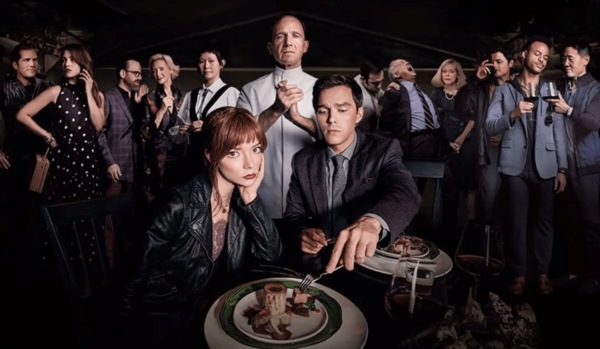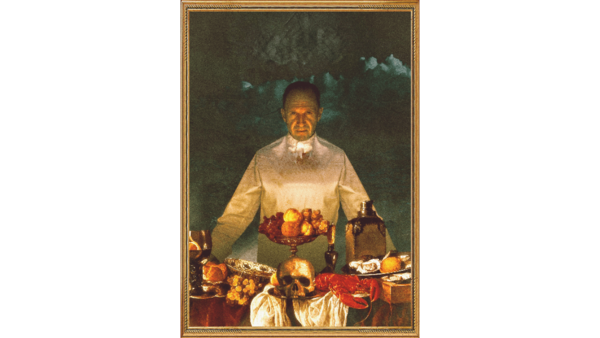Newsletter: 'The Menu' Attempts Sinner Service, Sans Bite
Why the Ralph Fiennes and Anya Taylor-Joy starrer's moral high ground is founded on less-than-firm turf.

Last Updated: 10.50 PM, Jan 18, 2023
This column was originally published as part of our newsletter The Daily Show on January 9, 2023. Subscribe here. (We're awesome about not spamming your inbox!)
***
TOWARDS THE TAIL END of Nicolas Winding Refn's stylish neo-noir Drive (2011), there is a scene where the protagonist, known only as 'Driver' and played almost to perfection by Ryan Gosling, stands at the door of a pizzeria which doubles as a mobster-hangout and stares at the scenes of revelry unfolding inside, with bloody murder on his mind. Eventually, he backs off in favour of chasing the big baddie (the reliable Ron Perlman) down alone, but it is tempting to entertain the possibility of what would have happened if he had just stepped inside at that moment. The very next year, the breakout indie video game Hotline Miami attempted to run with the speculative scenario. In game developers' vision, shared by many, the result was carnage.
Almost a decade later, director Mark Mylod, and screenwriters Seth Reiss and Will Tracy, test another such premise with their dark comedy/horror/thriller/satire, The Menu: It is what would happen if Nicolas Cage's character from Pig (2021) — the world-weary former star-chef Robin Feld — turned against his patrons with a fiery vengeance instead of retreating to a cabin deep in the Oregon woods.

THE MENU follows a couple, Margot Mills (Anya Taylor-Joy) and Tyler (Nicholas Hoult), as they visit an exclusive destination restaurant on a remote island where acclaimed chef Julian Slowik (Ralph Fiennes) has prepared a lavish tasting menu. But also part of the experience for the unwitting guests are some lurid surprises.
The said guests include a band of caricatured (some almost comically one-dimensional) characters, each immediately recognisable as being there to serve a specific purpose in the film's social commentary. We have the wealthy couple (Reed Birney and Judith Light), a trio of tech bro types (Rob Yang, Arturo Castro and Mark St Cyr), an influential food critic and her editor (Janet McTeer and Paul Adelstein, respectively), a washed-up film star (John Leguizamo, always good to see him) and his assistant (Aimee Carrero). Also in the mix are the restaurant's maître d' (Hong Chau) and sommelier (Peter Grosz).
With a score by Colin Stetson (who has worked on a fair few horror soundtracks of late) and the cut-off location device, the film doesn't take long to tap into the eerie. In fact, the picturesque, virgin landscape, punctured by few structures (including Slowik's semi-concealed, off-bounds home), brings to mind Ari Aster's atmospheric Midsommar (2019).
Once seated, we get our first glimpse of Slowik, with his sharp and mysterious aura. Dinner begins, with each course introduced by the chef via increasingly unsettling monologues. While Fiennes is tailor-made for the role — with his imposing figure, sinister composure and delivery — one is left with a feeling of having seen him play this character before, many times, just in different costumes. Pretty good, but that's what you expect of him. The overlapping shades between Pig's Robin Feld and Slowik are difficult to miss here. The temperament, the celebrity, the cynicism, the striving for perfection in the world of high dining, the disillusionment. Only, Cage brings more gravitas and range to the table in Pig.
As the evening wears on, secrets worm their way up to the surface, as each character is forced to confront their past misdeeds. By the time the fourth course is served, it is beyond doubt that something is horribly wrong with the night's proceedings, and that much worse awaits. But Slowik, with the assistance of his uber-authoritative maître d'hôtel, already has everyone under his thumb, his privileged patrons unable to even comprehend being at the receiving end of someone else's superiority. That is, everyone but Mills.
See, she wasn't even supposed to be there. Tyler's designated guest pulls out, so she's just filling in for the night. It is clear she's out of place, and at the same time the only who can resist Slowik's almost hypnotic control over his guests. In this world of excesses, deceit and forever-dissatisfaction, Mills becomes the proxy for the audiences, weary of everyone's schemes and intentions. Originally, Emma Stone was supposed to play the character, but was replaced following scheduling conflicts. And while Stone might have been a slightly better suited for the role, Taylor-Joy does a good job pulling off the balancing act between innocent bystander and street-smart survivalist.
This is also the point where the film drops subtlety and suspense in favour of a full-throated Us-vs-Them, eat-the-rich narrative. Understanding Mills' predicament and feeling an affinity towards a fellow “shit shoveller”, Slowik gives her a choice: to join the givers (the service industry, i.e. his kitchen staff) or the takers (the consumers, i.e. his patrons tonight); that is to say, at the halfway mark, the audience is asked to pick a side — are you a giver or a taker? Never mind that both are headed for the same fate. Here, things begin to get murky.
Slowik blames each of his guests and their vices for ruining [his] art and his life. And while he acknowledges his own restaurant and the extravagant dining experience are part of the problem, somewhere along the line, he seems to have discovered a moral high ground from which to mete punishment onto those he holds responsible for the corruption of his work. In a world of ridiculous inequality and unabashed abuse of power by the rich, Slowik's accusations against his patrons hit home, and as a viewer, there is an urge to cheer him on, on his seemingly righteous quest. The only thing is, coming from him, it never feels sincere.
The film makes Slowik's abusive tendencies towards his staff plain. They all live in a crammed dormitory; he takes up the big house. His emotional harassment and gaslighting proves to be fatal, and he has a history of sexual harassment (he's a star after all, as one of his sous-chefs puts it). The staff complain that he won't let them go. Despite all this, even the best live in constant fear of losing their jobs to someone else, and are willing to put their lives on the line for the same. Here, more than anywhere else, we get a glimpse of the hierarchies created within the service industry and the exploitation doled out by the top, as much as it from the consumers. This cycle of abuse — of which Slowik is a part — is ceaseless.
Now, as much as he likes to bundle himself up with “the givers”, or be a spiritual representative for the entire service industry, his staff is but expendable fodder in his quest for retribution, and realising his vision. Did the lifelong grind on the whims of the rich turn him exactly into the type he resents? Perhaps. But when we meet him in the film, it is hard not to see him as someone quite privileged; at best, out to inflict his wrath (at any cost) on a society that degrades his passion, at worst, someone driven by ego and self-admitted boredom to go out in a blaze of glory. Nevertheless, there is something familiar to his opaque motivations — how many movements have we seen die at the hands of their leaders? Eat the rich, but would you want a Slowik to be the flag bearer, your voice?
While The Menu flaunts elements of satire and some clever black comedy, it's not as subversive as it believes. Even the defence of 'film logic' is not nearly enough to convince one that the rich and arrogant patrons would just let Slowik walk all over them after being shown the fault in their ways, or accept punishment for it. While this works in the first half, when they are too dumbfounded and wrapped up in their version of reality to comprehend what is happening, by the end, it just feels like a cop out.
The Menu is a good film that thinks it's great. It challenges you, makes you laugh at its theatre of the absurd, and leaves you with much to contemplate; however, it is often overwhelmed by its own ideas — which ultimately lack bite. If there is one takeaway that the film serves with flourish, intentionally or otherwise, it is that looking for easy conclusions is a fool's errand.
